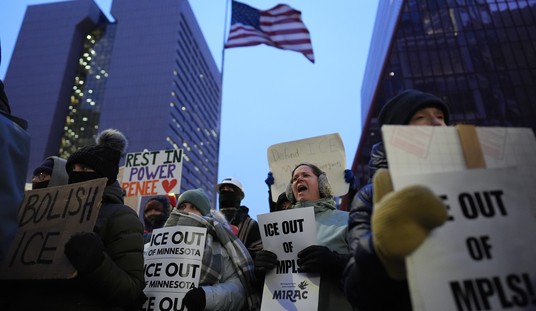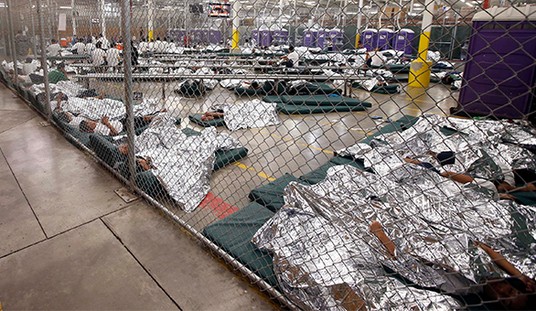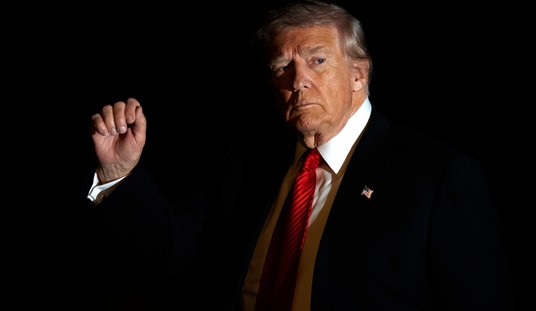This clip from an hour-long conversation between Homeland Security Secretary Jeh Johnson and the Washington Post’s David Ignatius is making the rounds today, but may mean less than it seems. PJM’s Nicholas Ballasy picks up on a 90-second exchange about the election results and Russian hacking in which Johnson dismisses any suggestion that the former got directly impacted by the latter. However, Johnson’s has a little more to add to that:
“I think it’s important to note that on election night we had our guard up for this. We had our crisis action team ready on election night. We did not see anything that amounted to altering ballot counts or degrading the ability to report election results, nothing out of the ordinary,” Johnson said during a Washington Post Live event on Tuesday evening. “There’s always a certain amount of noise that goes on there but on election night itself, we didn’t see anything that affected the ballot count.”
It’s not surprising that DHS was “on guard” on Election Night, after weeks of warnings about Russian hacks on political organizations like the DNC and the Center for American Progress. (Whether or not those warnings were accurate is still a matter of some debate, although US intel agencies seem to agree that Russia was involved, at least.) The White House has said all along that there was no evidence that voting systems got penetrated, which would be all but impossible to accomplish anyway, given our decentralized voting infrastructure.
A careful listen to Johnson makes it clear that he’s saying the same thing — and being careful not to go any further than that. When Ignatius asks him whether Russian hacking influenced the outcome, Johnson demurs:
Washington Post columnist David Ignatius asked Johnson if he could assure the country that Russian hacking did not affect the outcome of the presidential election.
“We see no evidence that hacking by any actor altered the ballot count or any cyber actions that deprived people of voting. Whether the disclosures that we made that we pointed out in our Oct. 7th statement altered public opinion, that’s beyond my level of expertise,” he replied.
Ignatius’ question addresses the acute complaint about Russian hacking, and the argument for having electors overturn Trump’s election. Johnson pointedly refuses to address that question, wisely sticking to what he knows and can prove. Ignatius’ question doesn’t have a data-based answer; it’s a matter of opinion, not of proof.
In effect, it’s a Rorschach test. If you think that voters are essentially idiots who can’t help but be hoodwinked by “fake news” and gossip about e-mails, then of course the answer is yes. If you think that Hillary Clinton had a long history of being unlikeable and whose baggage was self-created, then of course the answer is no.
Hillary’s defenders have largely argued that the Russian hacks created her favorability problems and left the voters-are-stupid argument mainly unspoken. But is that true? Remember that Philip Bump performed an analysis in March 2015, before the DNC hacks had even started, showing that Hillary wound up under water in every electoral cycle (except 2006) whether she ran for office or not. It’s tough to blame the Russian hacks for this:

By June 2015, way before the DNC e-mails were published by Wikileaks, Hillary’s favorables had already dropped into negative territory:
Just two months ago, Hillary’s favorability rating in the CNN series was 53/44, a +9 result. It’s now 46/50, for a 13-point swing in the gap. Interestingly, the CNN series never had Hillary’s favorability in negative territory in the 2008 presidential race; the worst result she had was 49/44 in March 2007 but spent most of the campaign in double-digit positives while Gallup had her consistently in negative territory. Scoring this badly in CNN’s poll just four years after her September 2011 peak of 69/26 and eight months after a 59/38 last fall is a breathtaking decline, and shows just how significant this collapse is. …
Her WaPo/ABC favorability is -4, same as CNN’s, although just slightly lower on response at 45/49. It goes to -7 among registered voters (44/51), and a whopping -16 among independents (39/55). It’s only barely positive among women, and even then only by plurality at 48/44. Her overall favorability was 49/46 in March, and 58/38 in January 2014 — a fall of 24 points in 17 months.
The dramatic drop in favorability took place long before the Russian hacks came into play at all. They were largely driven by Hillary’s e-mail scandal and her refusal to stop lying about it. The e-mails that really drove the nails into her political coffin got released by the State Department, not Wikileaks. Without that secret, unauthorized e-mail system and Hillary’s refusal to turn over all records at once, James Comey wouldn’t have had any significant role in the last year of the election cycle.
None of this relieves us of the responsibility to thoroughly investigate alleged Russian intrusions into our political organizations. But it’s clear that the real author of Hillary’s defeat is Hillary Clinton, and the Russian panic is yet another manifestation of the Democrats’ denial.








Join the conversation as a VIP Member